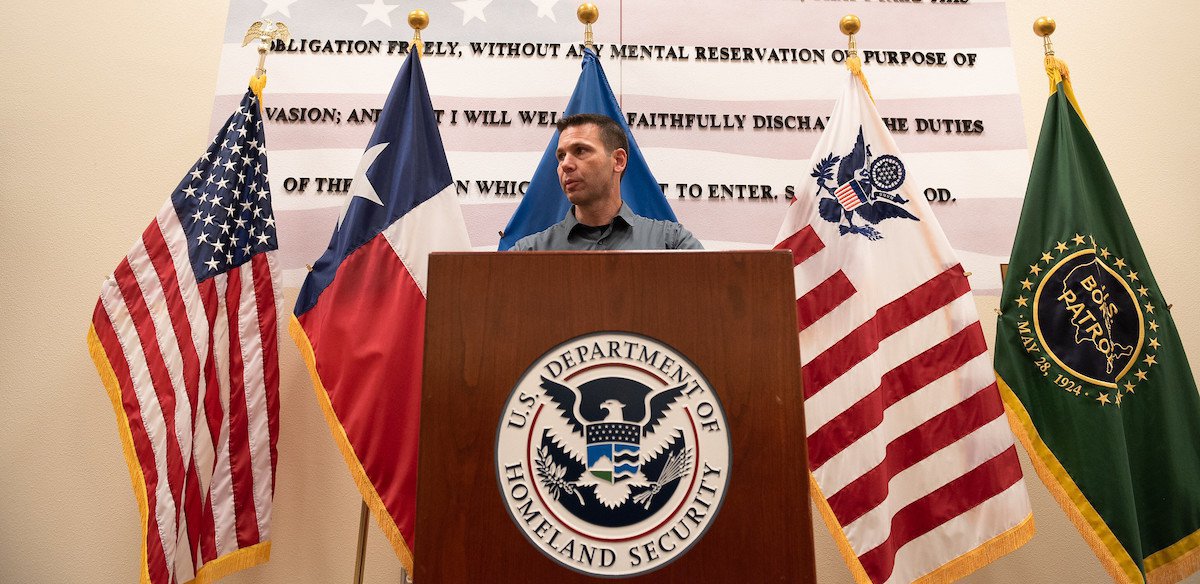The Department of Homeland Security, like other federal agencies, puts out an annual report about the Freedom of Information requests it has received, most of which are destined for its immigration-focused components, often from individuals looking to obtain their own documents.
According to the report, DHS received 395,751 FOIA requests in 2018, the most of any federal department or agency. Over the last four fiscal years, the department says it has processed an average of 42 percent of all requests in the federal government, while only accounting for about 10 percent of FOIA-associated expenses.
Still, the department acknowledges the volume of requests is a concern. Despite focusing its efforts in 2018 on reducing processing times and closing out its oldest requests, it ended the fiscal year with 53,971 requests pending in its backlog, which grew by about 9,800 requests from 2017. While DHS says the growth in the backlog is “disappointing,” it highlighted overall reduced response times and plans to dedicate resources to addressing staffing challenges and technology limitations that it says are “systemic issues that contribute to the FOIA backlog.”
Additionally, DHS encompasses several components responsible for immigration and border security: U.S. Citizenship and Immigration Services, U.S. Customs and Border Patrol, and U.S. Immigration and Customs Enforcement. More than 90 percent of all FOIA requests within the department were directed at these three components; the USCIS in particular handled nearly half of all requests. DHS attributes this primarily to a large number of people requesting documents that pertain to “their personal interactions with immigration officials.”
Withholding Information
In addition to standard exemptions, some federal statutes (other than FOIA) specify information that can be withheld from requests. While many of these were invoked just once or twice, some laws were used by immigration-focused components thousands of times to deny requests.
The Immigration and Nationality Act allows agencies to withhold certain records surrounding visas and the reasoning behind whether a person was granted or denied one. The USCIS invoked this law more than 32,000 times to block release of this information, far more than any other statute used by any other component of DHS.
ICE frequently used transportation-focused laws to block releases of information, in several cases more frequently than the Transportation Security Administration.
One subsection of a statute, which is part of a code of laws dictating the TSA’s operations and functions, was invoked 5,366 times by ICE and just over 100 times by the TSA. The statute calls for the Administrator of the TSA to decide whether disclosing material developed or obtained carrying out security would invade personal privacy, reveal trade secrets, or be detrimental to transportation security. The law goes on to state that the Administrator may not transfer these powers to any other department, agency, or function of the government unless “otherwise provided by law.”
ICE, CBP, USCIS, and the central DHS FOIA office had not responded to requests for comment by publication time.
Exemptions and Denials
ICE and USCIS only partially granted the vast majority of their requests, denying other portions based on exemptions. The report provides no distinction on when these exemptions were used to fully deny or partially deny requests, but all immigration-focused components relied heavily on three exemptions to exclude information.
The first two, exemption 6 and exemption 7(c), cover information, including law enforcement records, that would clearly be an invasion of privacy. The second, exemption 7(e), exempts disclosure of law enforcement techniques, guidelines, and procedures. ICE used these extensively, even among the immigration-focused components, applying some exemptions to upwards of 80 percent of all requests it received.
Additionally, the three components denied a disproportionate amount of requests for being “improper” or duplicate FOIA requests compared to other components within DHS. Other components denied on these grounds at most a few hundred times, with some reporting single-digit numbers. Combined, the immigration-focused components denied improper FOIA requests over 19,000 times and duplicate requests over 21,000 times.
These components also received significantly more requests for expedited processing, partially due to the time-sensitive nature of immigration proceedings. CBP and the USCIS denied large portions of these requests, the latter component granting expedition to only 68 out of 1,123 requests it received, a rate of about 6 percent. Of those that were expedited, processing sometimes took longer than standard requests. Taking into account the unusually long-standing requests that can skew a component’s average, expedited requests within CBP had a median response time higher than expedited requests it received, both simple and complex.
Tracking Errors
In addition to voluminous backlog issues, DHS also made significant corrections to numbers it reported in its previous annual FOIA report from 2017. All but two of the DHS components subject to FOIA corrected 2017 numbers regarding still-pending requests due to internal reporting errors.
In addition, ICE did not account for over 17,000 referrals it received from USCIS in 2018, with those requests absent from the report. These referrals will be accounted for in the 2019 FOIA report, and DHS states that ICE has “taken steps to ensure accurate tracking of referrals going forward.”
You can read the full report here and help us read through other 2018 annual FOIA reports via the button below.




